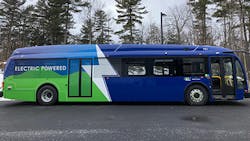Green Mountain Transit, Burlington Electric Department unveil first two electric transit buses
The first two electric-powered transit buses have been unveiled by Green Mountain Transit (GMT) and Burlington Electric Department (BED).
The new buses, scheduled to be in service this March, are the first electric transit buses in Vermont and will help reduce carbon emissions in Burlington and Chittenden County while providing clean, quiet transit along GMT service area routes. As part of the Burlington Net Zero Energy strategy, BED provided significant incentives, secured additional funding from VLITE and, together with the Vermont Agency of Transportation (VTrans), helped secure further funding from the federal government to ensure that GMT had the resources necessary to expand electric transit options in Burlington.
“The arrival of the state’s first two electric buses marks an important milestone for our Net Zero Energy city response to the Climate Crisis in Burlington,” said Burlington Mayor Miro Weinberger. “These E-buses will be powered by BED’s 100 percent renewably sourced electricity instead of fossil fuels and will improve air quality. Moreover, buses are among the largest, most visible and most heavily used vehicles on our roads. If we can electrify public buses, we should be able to electrify everything, which is exactly what we need to do over the next decade to meet our climate goals. I look forward to seeing many more E-buses and other EVs in Burlington in the coming years.”
“We know nearly half of the emissions that contribute to climate change come from the transportation sector, which is why efforts like this are so important,” said Vermont Gov. Phil Scott. “Over the last three years, my team has worked with the legislature and many other partners to offer incentives that make it more affordable to purchase electric vehicles, and investments to build out EV charging infrastructure and public transportation. I’m pleased to see progress on this collective work unveiled today.”
Made in America Buses reduce carbon emissions
The new buses arrived in Burlington earlier this month and were engineered and manufactured by Proterra at its east coast headquarters in Greenville, S. C. The GMT buses being replaced by the new buses had been travelling approximately 30,000 miles annually at 4.25 miles per gallon, translating to approximately 7,059 gallons of diesel per year. When the number of mmBTUs (0.1374) per gallon and the pounds of CO2 (161.3) per mmBTU are applied to 7,059 gallons, the result is the avoidance of 78 tons of CO2 emissions per E-bus per year.
Miles on a single charge
The buses have 324 kWh of battery capacity and will be charged overnight during off-peak hours with 100 percent renewably sourced electricity at GMT’s Burlington garage on Queen City Park Road. While Proterra indicates that the buses have an operating range of up to 187 miles on a single charge, actual range will depend on several variables, including topography, passenger loads, number of stops and weather. Proterra’s initial range estimates for GMT, based upon local topography and weather and on comparing the actual range of Proterra buses that are serving other similarly situated locations, are 140 miles in non-winter months and 100 miles in winter months. GMT will have an accurate sense of mileage range once the new buses are in full operation in their service environment.
Routes the buses will travel
Proterra trainers are on-site at GMT this month working with the maintenance and training departments, whose members will become the trainers for the entire GMT operator pool. The goal is to have the new buses in service in March. GMT initially is planning to operate the new buses on the Red Line (North Avenue and Williston Road), which includes service to the University of Vermont and the University Mall. This route will provide Burlington High School students with the opportunity to ride an E-bus to school. GMT says an important goal is to maximize air quality benefits by running the buses on routes that service the urban core. The Red Line route also is the busiest route in the GMT system, averaging close to 62,000 monthly boardings.
Funding Collaboration
Funding for the two buses, which together cost more than $2 million including the charging equipment and GMT facility work, was a collaboration provided by the following partners:
- $131,000 –Burlington Electric Department
- $175,000 – VLITE
- $480,000 – Federal Government Low/No Emissions Grant
- $1,405,000 – GMT, along with Federal and State Transportation Funding
“The GMT team is thrilled to be deploying such an efficient, new technology that is good for our community and our environment,” said Jon Moore, GMT interim general manager. “We are extremely grateful to Mayor Weinberger and the Burlington Electric Department for their support and help in bringing buses to GMT. We offer thanks as well to Sen. [Patrick] Leahy, Gov. Scott and VTrans and VLITE. GMT looks forward to exploring new sustainable public transit options for the future.”
BED General Manager Darren Springer added, “Burlington Electric Department is proud to have provided incentives and support to bring these electric buses to Burlington. These buses support our Net Zero Energy efforts and will help our community more efficiently utilize our electric grid by charging during off-peak hours. Charging off-peak benefits all our customers and helps keep rates low and affordable. By using BED’s renewable electricity, instead of diesel, to charge, the buses also will keep more dollars in the local economy.”



